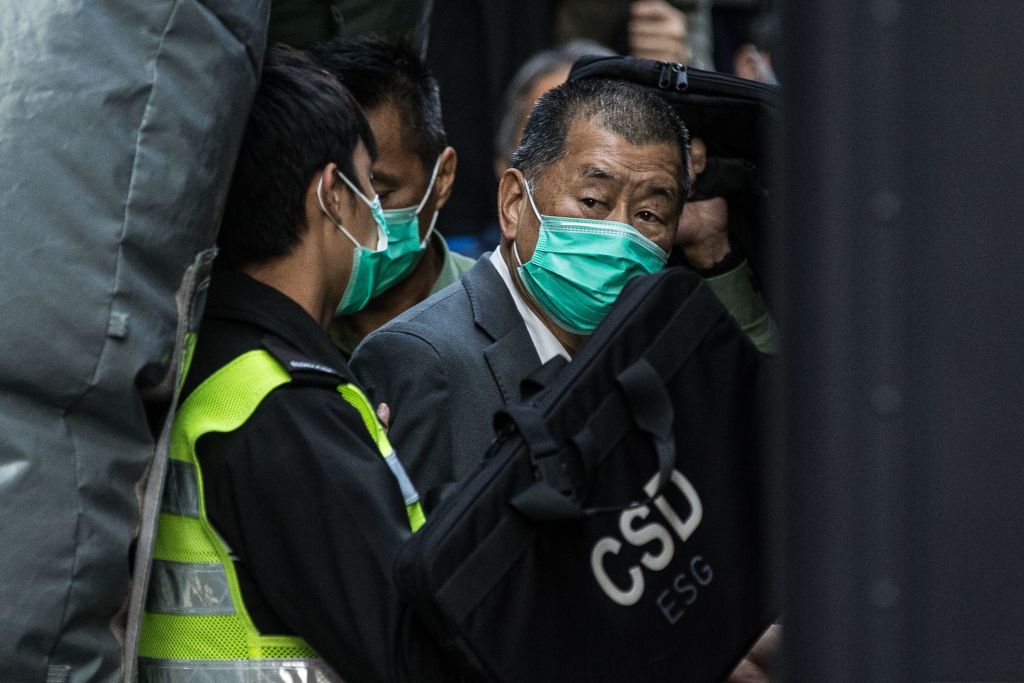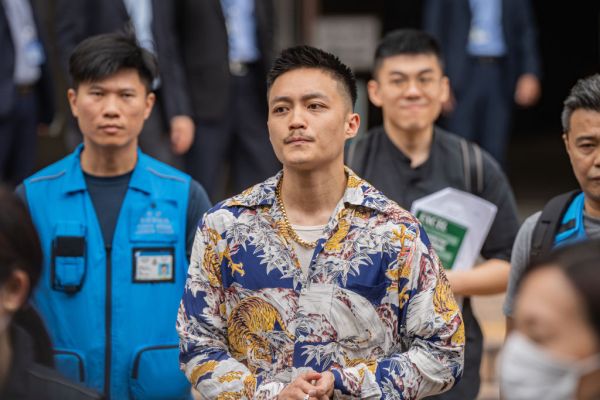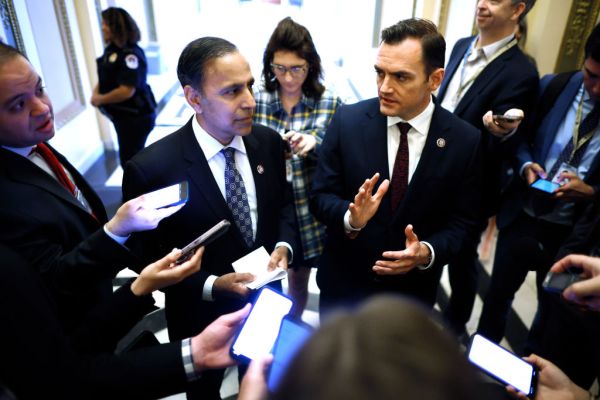Happy Wednesday! And happy 2024! After a restful holiday season, we’re prepared (we think) to keep you up to speed on what is surely going to be an insane year.
Quick Hits: Today’s Top Stories
- Hamas’ deputy leader Saleh al-Arouri and at least six other members of the terrorist group were killed in a Hezbollah-run neighborhood of Beirut, Lebanon, on Tuesday in a suspected Israeli drone strike, according to Lebanon’s National News Agency.* Israeli leadership has yet to confirm if it was responsible for the assassination of the terrorist leader who helped to design the October 7 attacks on Israel, though officials from both the U.S. and Lebanon attributed the attack to Israel. Lebanese Prime Minister Najib Mikati accused Israel of violating his country’s sovereignty by carrying out the attack, and said he would file a complaint with the U.N. Security Council. Meanwhile, Israeli military officials have declared a “very high level of readiness” and urged Israeli civilians to heed the instructions of Home Front Command in preparation for the possibility of retaliation by Hezbollah, a Hamas-aligned group with weapons and fighters stationed along Lebanon’s southern border with Israel.
- In an 8-7 ruling, the Israeli Supreme Court on Monday struck down a law that would’ve stripped the judiciary of its ability to reverse decisions by government officials on the basis that they are “unreasonable.” The invalidated legislation, passed by the Knesset in July as an amendment to Israel’s quasi-constitutional set of Basic Laws, was a key component of Prime Minister Benjamin Netanyahu’s controversial judicial reform proposal. The ruling marks the first time the high court has exercised judicial review over a Basic Law.
- U.S. Navy helicopters sank three Houthi boats in the Red Sea on Sunday, as the Iranian-backed pirates attacked and attempted to board the Maersk Hangzhou, a Singapore-flagged, Danish-owned container ship that had come under Houthi missile fire the night before. U.S. forces “responded to the distress call and in the process of issuing verbal calls to the small boats, the small boats fired upon the U.S. helicopters with crew served weapons and small arms,” read a statement from U.S. Central Command (CENTCOM) describing the event. “The U.S. Navy helicopters returned fire in self-defense, sinking three of the four small boats, and killing the crews.” Shipping giant A.P. Moeller-Maersk will pause all transit through the Red Sea until further notice after the attack on its ship. The USS Gerald R. Ford, deployed to the eastern Mediterranean Sea after Hamas’ October 7 attack on Israel, is returning to its home port in Norfolk, Virginia, officials announced on Monday. Meanwhile, the Iranian warship Alborz reportedly entered the Red Sea on Monday.
- The Russian military continued its assault on Ukraine Tuesday morning, firing missiles and drones into Kyiv in response to a Ukrainian attack on the Russian city of Belgorod over the weekend. Ukrainian air force officials reportedly managed to shoot down 72 of the 99 missiles launched into the country, though the attack still killed five civilians and injured nearly 130 others. Yesterday’s attack on Kyiv followed a Russian attack on Kharkiv on Sunday, which involved six missiles and Iranian-made Shahed drones.
- Lee Jae-myung, the leader of South Korea’s Democratic Party, was stabbed in the neck on Tuesday in Busan, South Korea, while answering questions from reporters during a visit to the site of a planned international airport. The suspect was arrested at the scene and later confessed to attempting to kill the opposition leader, who is in an intensive care unit but expected to survive. Police are still investigating a motive for the attack.
- A 7.6-magnitude earthquake struck the Japanese prefecture of Ishikawa on Monday, killing at least 62 people and flattening thousands of buildings. More than 90 percent of homes in the town of Suzu, located near the quake’s epicenter, were destroyed.
- Harvard President Claudine Gay resigned on Tuesday amid criticism over her response to Hamas’ October 7 attack on Israel, her reaction to and congressional testimony about antisemitism on Harvard’s campus, and mounting accusations of academic plagiarism. “After consultation with members of the [Harvard] Corporation, it has become clear that it is in the best interests of Harvard for me to resign so that our community can navigate this moment of extraordinary challenge with a focus on the institution rather than any individual,” Gay wrote in an email Tuesday afternoon. “When my brief presidency is remembered, I hope it will be seen as a moment of reawakening to the importance of striving to find our common humanity—and of not allowing rancor and vituperation to undermine the vital process of education.” Gay’s presidential tenure was the shortest in Harvard history, lasting just six months and two days.
Jimmy Lai on Trial

On Tuesday, Hong Kong pro-democracy publisher and activist Jimmy Lai repeated “not guilty” three times—once for each of the national security charges he’s facing in Hong Kong. He did not stand before a jury of his peers, but rather before three Hong Kong High Court judges, handpicked by the Beijing-backed chief executive of the region. The panel will, at the end of his likely months-long trial, decide whether Lai will spend the rest of his life behind bars.
The 76 year old has spent more than 1,000 days in prison since his re-arrest in December 2020 on charges of sedition and colluding with foreign forces. The trial, which began on December 18 and has been called “unfair” by Lai’s attorneys, has become a test of Hong Kong’s judicial independence and the highest-profile example of deteriorating rule of law and fundamental freedoms in the “Special Administrative Region” as China tightens control of its sphere of influence.
Lai is a Chinese-mainland-born, self-made billionaire who earned his fortune in the clothing industry before turning to publishing. He’s been a staunch pro-democracy activist and persistent nuisance to Beijing since the Chinese Communist Party (CCP) sent tanks to crush the Tiananmen Square rebellion in 1989, even declaring himself in late 2020 “a born rebel.” In 1995, Lai launched Apple Daily, a pro-democracy newspaper frequently critical of the CCP. When Hongkongers flooded the streets in 2019 to protest a Beijing-backed law that would have allowed Hong Kong natives to be extradited to mainland China for trial, reporters for Apple Daily covered the demonstrations and at times also encouraged them. Lai marched with protesters, as he had in several other pro-democracy demonstrations over the last few decades.
The year 2019 proved a turning point for Hong Kong, which was increasingly being squeezed by authorities on the mainland. Though the protests—which sometimes featured violent clashes between some protesters and Hong Kong’s police—had largely subsided by the time the COVID-19 pandemic started in early 2020, the effects were just beginning to be felt. In February 2020, Lai was arrested for his involvement in “unauthorized” public gatherings in August of the previous year, and in the spring of 2020, the CCP introduced its “Law of the People’s Republic of China on Safeguarding National Security in the Hong Kong Special Administrative Region.”
“Since the city’s return to China in 1997, I have feared that one day the Chinese Communist Party would grow tired not only of Hong Kong’s free press but also of its free people,” Lai wrote in an op-ed for the New York Times in late May 2020, in which he predicted his own arrest. “That day has come.”
The national security law came into force almost 23 years to the day after the British handed control of Hong Kong back to China with an agreement that Beijing would allow the territory to remain autonomous for 50 years. Put in place without the consultation of Hong Kong’s legislators, the national security measure laid out four broad offenses against national security: “secession, subversion, organization and perpetration of terrorist activities, and collusion with a foreign country or with external elements to endanger national security in relation to the Hong Kong Special Administrative Region.” A potential penalty for a national security offense is life imprisonment.
“It completely overhauled Hong Kong’s status as a territory that was famous for its rule of law,” William Nee, research and advocacy coordinator at the non-profit Chinese Human Rights Defenders, told TMD.
Hong Kong’s former chief executive, Carrie Lam, insisted at the time that the law was meant to target only a “small minority” of offenders—but according to Eric Lai (no relation to Jimmy), a nonresident fellow at Center for Asian Law of Georgetown University Law Center, that’s not clear in the text of the law. “Beijing, through the [national security] law, imposed four new national security offenses that are fakely and broadly defined, making almost all kinds of opposition activities in Hong Kong crimes, even though they are non-violent in nature,” Eric Lai told TMD. “International advocacy, civic, non-binding referendum, primaries, or even labor strikes could now be labeled as criminal activities if they are seen as endangering the security of the regime.” So broadly defined, he said, the law has had a chilling effect on civil society and academic freedom in Hong Kong.
According to Eric Lai’s analysis, between July 2020 and July 2023 more than 260 people were arrested, some multiple times, on national security-related charges. Of those, 148 were charged with crimes, and many were held without bail.
It wasn’t long before Jimmy Lai joined their ranks. Hong Kong authorities raided Apple Daily in August 2020, arresting Lai for allegedly having “colluded with foreign forces.” After being released on bail, he presented himself to authorities in early December 2020—under the terms of his bail agreement—and was arrested again on a separate charge of fraud. Hong Kong prosecutors accused Lai of violating the terms of his lease for his newspaper’s office space, and just days later he was charged under the national security law. In June 2021, with its assets frozen by the government, Apple Daily was forced to close.“He understood the dangers,” Nee told TMD. “He could have left, and he didn’t leave.”
Almost three full years later—every day of which he spent in prison either serving terms for other sentences or on pretrial detention—Lai’s trial began on December 18.
The “collusion” in question seems to consist mostly of his contact with U.S. politicians, including then-Vice President Mike Pence, then-Secretary of State Mike Pompeo, and Rep. Nancy Pelosi, who was House Speaker at the time of contact in 2019. The lead prosecutor in the case, Anthony Chau, said Lai had broken the law by calling on the officials to sanction Hong Kong and Chinese officials. Chau also pointed to interviews Lai gave to foreign outlets, Lai’s 2020 editorial for the Times, and WhatsApp messages with American officials and international human rights activists as evidence of collusion. The sedition charge—which the panel of judges declined to dismiss during the first week of the trial—is related to pieces published in Apple Daily from April 2019 to June 2021 “with a view to polluting the minds of the impressionable ones.”
“This case is about a radical political figure,” Chau said Tuesday, “who conspired with others to bring into hatred and stir up opposition to the government of [Hong Kong] and the central authorities and to collude with foreign countries or external elements to endanger national security.”
Jonathan Price, a barrister who’s a member of Lai’s international legal team, disagrees. “The charges are purportedly aimed at securing national security, but in fact, the substance of it is just him expressing views, discussing the future of Hong Kong, trying to find a political solution to what he saw as China’s increasing authoritarianism, and nothing more than that,” he told TMD. “There’s no cell of bomb makers. There’s not even throwing rocks at the police. These are people discussing ideas. These are people committing politics—conspiring to commit journalism, nothing more than that.”
International observers and Lai’s allies argue the deck is stacked against him, and it’s unlikely the outcome will be anything but a conviction and life in prison. In April, Hong Kong’s head of security boasted of a 100 percent conviction rate in national security cases, and because this is a national security case, Lai faces a panel of three judges rather than a jury. The judges were selected by Hong Kong Chief Executive John Lee, himself selected by a Beijing-backed election committee. Lee, who served as head of security for the Hong Kong government during the 2019 protests, has a reputation as a hardliner. “[Lai’s] trial is a landmark case for fair trial and due process in Hong Kong because many of his due process rights are highly restricted,” Eric Lai said. “The judges are handpicked by the government—no jury trial; he’s been denied bail since 2020; and he cannot access his lawyer of choice following the common law practices in Hong Kong in the past. All these practices revealed that the national security law could not safeguard a fair trial for citizens in Hong Kong.”
Jimmy Lai–a British citizen—also has the support of the U.K. government. Foreign Secretary David Cameron last month called on Hong Kong to release Lai and condemned the national security law ahead of the trial. “[The law] has damaged Hong Kong, with rights and freedoms significantly eroded. Arrests under the law have silenced opposition voices,” he said. “I urge the Chinese authorities to repeal the national security law and end the prosecution of all individuals charged under it. I call on the Hong Kong authorities to end their prosecution and release Jimmy Lai.” The U.S. State Department joined the U.K. in urging Lai’s release.
China’s embassy in the U.K. quickly shot back. “We firmly oppose and strongly deplore U.K. politicians’ appalling acts of endorsing Jimmy Lai,” a spokesperson said. “We strongly demand that the U.K. immediately stop sheltering anti-China, Hong Kong destabilisers, [and] stop smearing the National Security Law.”
Lai, for his part, has maintained not only his innocence but his resolve. Entering the courtroom Tuesday, he smiled and waved at his wife and three children who were sitting in the gallery. “If they can induce fear in you, that’s the cheapest way to control you and the most effective way and they know it,” Lai said in December 2020, before his arrest. “The only way to defeat the way of intimidation is to face up to fear and don’t let it frighten you.”
Worth Your Time
- Hate crimes in the U.S. increased by 11 percent in 2021—and preliminary research suggests that the trend has continued since. Writing for The Atlantic, Charles Fain Lehman (who is also a Dispatch contributor) explained that, while many states have drilled down on addressing the “hate” in hate crime, the criminal justice system itself could be used to better combat and reduce these atrocities. “Many hate crimes, in other words, are characterized not just by hate, but also by impulsive, disinhibited behavior,” he wrote. “That kind of behavior characterizes much non-hate-criminal offending too, from car theft for joyrides to shoot-outs incited by minor slights. The average hate-crime offender is not a ‘specialist’ in hate crime. Rather, most have extensive criminal histories and are similar in important ways to other criminals.”
- Ken Block, the voting data expert hired by the Trump campaign to find evidence of fraud in the 2020 election, reflected on the experience in an op-ed for USA Today. “The findings of my company’s in-depth analysis are detailed in the depositions taken by the Select Committee to Investigate the January 6th Attack on the United States Capitol,” he wrote. “The transcripts show that the campaign found no evidence of voter fraud sufficient to change the outcome of any election. … And yet, the cries that the election was lost or stolen due to voter fraud continue with no sign of stopping. Whether a stump speech, outrageous lawsuits like the so-called Kraken cases filed by Sidney Powell, Rudy Giuliani’s lies or the ongoing misguided efforts of people determined to prove the election was stolen, the constant drumbeat hardens people’s hearts and minds to the truth about the 2020 election.”
Presented Without Comment
Politico: Feds Add Allegations of Qatari Influence Against Indicted [New Jersey] Sen. Bob Menendez
Also Presented Without Comment
The Jerusalem Post: Tucker Carlson [Claims] Ben Shapiro, Pro-Israel Voices Don’t Care About America
Toeing the Company Line
- In the newsletters: The Dispatch Politics crew looked at Ron DeSantis’ late-game strategy in Iowa, Jonah besmirched (🔒) New Year’s Eve, Kevin pondered the (🔒) origins of the New Year’s holiday, and Nick wondered if (🔒) Republican primary voters are a lost cause.
- On the podcasts: Jonah ruminated on the New Year, the state of the GOP primary, and horseshoe theory, while political philosopher and former Harvard professor Harvey Mansfield joined Jamie on the Dispatch Podcast to trace the academic roots of wokeness. On today’s episode of The Remnant, Jonah is joined by Matthew Continetti to discuss whether 2023 should be considered the worst year in modern political history.
- On the site over the break: Hannah Anderson shared her story of trying to get her begrudging son to church, John McCormack answered your questions (🔒) in the Monthly Mailbag, Stirewalt considered what kind of model best fits Nikki Haley as a candidate, and Norman Hubbard explained the schism in the Methodist church.
- On the site today: John interviews Rep. Patrick McHenry of North Carolina on his way out, Charlotte provides a critical update on Israel’s multi-front war, Matthew Kroenig and Jeffrey Cimmino argue that President Joe Biden needs to hit Iran harder, and Jonah weighs the significance of Haley’s Civil War gaffe.
Let Us Know
What are some non-obvious topics you’d like to see TMD cover in 2024?
Correction, January 3, 2024: A previous version of this article stated that Saleh al-Arouri and seven other members of Hamas were killed in Tuesday’s strike. Saleh al-Arouri and six additional Hamas members were killed, bringing the total death toll to seven.









Please note that we at The Dispatch hold ourselves, our work, and our commenters to a higher standard than other places on the internet. We welcome comments that foster genuine debate or discussion—including comments critical of us or our work—but responses that include ad hominem attacks on fellow Dispatch members or are intended to stoke fear and anger may be moderated.
You are currently using a limited time guest pass and do not have access to commenting. Consider subscribing to join the conversation.
With your membership, you only have the ability to comment on The Morning Dispatch articles. Consider upgrading to join the conversation everywhere.